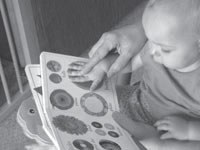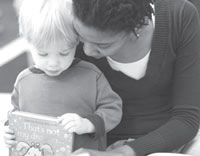Teaching approaches for developing early language and beginning literacy skills.

Language and literacy takes intentional thought, planning, and education. In building effective early literacy programming, consider the 10 views presented below.
- Young children need emotionally supportive adults and environments in order to have success in early literacy. Quality early literacy programming starts with nurturing adults who understand child development and developmentally appropriate practices.
 Start early. Literacy development begins at birth and continues throughout the child's life. Time spent babbling with a baby, holding a child and reading or singing, or showing children a shopping list, are all pathways to learning. While these may not seem like monumental educational strategies, over time they are helping to build strong experiences for learning.
Start early. Literacy development begins at birth and continues throughout the child's life. Time spent babbling with a baby, holding a child and reading or singing, or showing children a shopping list, are all pathways to learning. While these may not seem like monumental educational strategies, over time they are helping to build strong experiences for learning.- Use effective curriculum that fits your program's needs. Whether the early literacy curriculum is one that is purchased or independently created, it needs to be well researched, effective, and show measurable outcomes. A good literacy program is based on the needs of the children, the families, the teachers, and the school or program.
 Weave early literacy into all areas of development. Good early literacy practices connect within all domains of learning and development - physical, social-emotional, cognitive, language and literacy. For example, practitioners can provide writing/drawing materials in various play areas (not just the writing/drawing area), such as the dramatic play area, block area, and outside area; or singing and chanting can be done while transitioning, not just at music time; and materials can be print-labeled such as the word BALL can be written directly on a ball children play with. Consider using a literacy coach. Literacy coaches and mentors have a variety of roles, but can be the cohesive factor in carefully implementing early literacy across the curriculum and program.
Weave early literacy into all areas of development. Good early literacy practices connect within all domains of learning and development - physical, social-emotional, cognitive, language and literacy. For example, practitioners can provide writing/drawing materials in various play areas (not just the writing/drawing area), such as the dramatic play area, block area, and outside area; or singing and chanting can be done while transitioning, not just at music time; and materials can be print-labeled such as the word BALL can be written directly on a ball children play with. Consider using a literacy coach. Literacy coaches and mentors have a variety of roles, but can be the cohesive factor in carefully implementing early literacy across the curriculum and program. Standards are needed. When there are clear, researched, and evidenced based standards, there is clarity and intention behind early literacy programming. Standards provide knowledge in what to expect for children, what to include in curricula, and support the educator in assessing outcomes. Note: PA Early Learning Standards
Standards are needed. When there are clear, researched, and evidenced based standards, there is clarity and intention behind early literacy programming. Standards provide knowledge in what to expect for children, what to include in curricula, and support the educator in assessing outcomes. Note: PA Early Learning Standards - Families are important. Families need to know how important their involvement is and what steps they can take to support language and literacy development for their child. Practitioners can promote specific ideas with parents and caregivers, such as how important it is to talk with children and draw out children's ideas (Did you see that bird? Where do you think it might be going?), to add interesting words in our conversations, and to read books together.
 Connect early care programs and school districts. Research suggests that early literacy efforts show better outcomes when there are collaborations and shared planning between preschool programs and the early grades. This allows preschool, kindergarten, and early grade teachers to align their early literacy curricula and teaching practices to support one another.
Connect early care programs and school districts. Research suggests that early literacy efforts show better outcomes when there are collaborations and shared planning between preschool programs and the early grades. This allows preschool, kindergarten, and early grade teachers to align their early literacy curricula and teaching practices to support one another.- Everyday activities count. Activities such as talking, listening, and going on a walk are important in building early literacy. So are activities such as reading the cereal box, putting alphabet magnets on the refrigerator, and adding fun, new words in our conversations. Offer a broad set of daily experiences.
- Become knowledgeable in topics that are important in early literacy. Some common topics in early literacy are: oral language, phonemic awareness, print awareness, alphabet knowledge, knowledge of sounds (sounds of speech), and language links to the alphabet. Also, concepts such as segmenting words into sounds, decoding, and fluency are important.
- Professional development is continual. Practitioners need current, foundational knowledge in early literacy, early language, the processes of reading and writing, and the understanding of English language learners (or second language learners).
References:
-
A Next Social Contract for the Primary Years of Education by Lisa Guernsey and Sara Mead, New America Foundation
-
Education Reform Starts Early: Lessons from New Jersey's PreK-3rd Reform Efforts by Sara Mead, New America Foundation
-
Early Literacy: Policy and Practice in the Preschool Years by Dorothy S. Strickland and Shannon Riley-Ayers, National Institute for Early Education Research, April 2006
-
Where We Stand on Learning to Read and Write, National Association for the Education of Young Children and International Reading Association,
-
Learning to Read and Write: Developmentally Appropriate Practices for Young Children, National Association for the Education of Young Children and International Reading Association
TIPS 13-2

